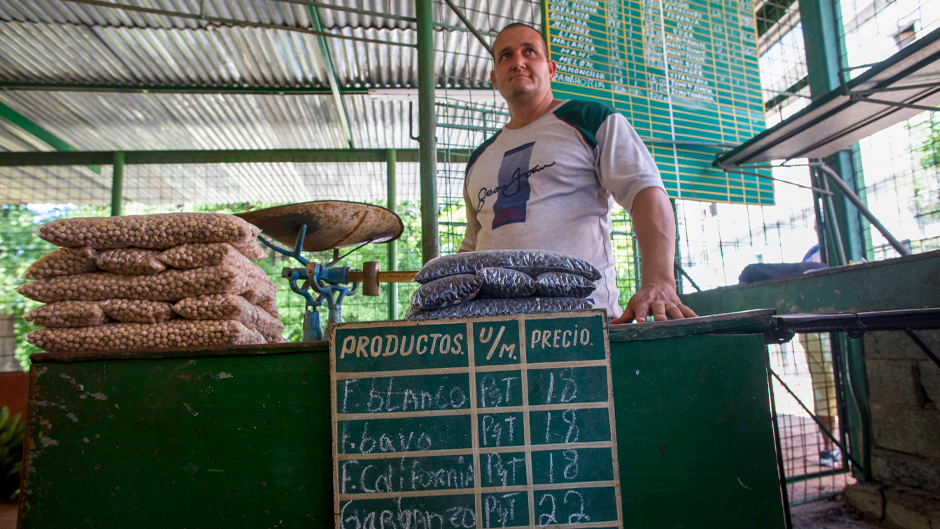Faced with a dire economy—which includes food and medicine scarcity, high inflation, and frequent electrical blackouts—the Cuban government is allowing independent businesses, called “pymes,” to expand on the island.
Pymes, which is an acronym for pequeña y mediana empresa—small and medium enterprises in Spanish—are regulated by the Cuban government. Some sell beauty products; others sell fruit juices, decorations, and furniture, as well as other merchandise. Some operate restaurants or privately run bed-and-breakfasts and guesthouses. Larger pymes import containers of goods including food and clothes for resale to the Cuban public, operate in the construction business, or even provide offshore software development solutions to foreign clients.
Although the island saw an initial expansion of its private sector under the restrictive framework of “self-employment” a decade ago, legally recognized pymes have been operating only since 2021 and are authorized to participate in more areas of the economy than private sector participants could before. Earlier this month, a group of 70 such entrepreneurs traveled to Miami to meet with representatives of U.S. companies, Cuban exiles, and others to explore ways they can expand their businesses and create partnerships.
“Pymes refer to 8,000-plus new, private businesses established in the country since 2021, when the Cuban government announced that they were going to allow private enterprises to be legally recognized entities and actors in the Cuban economy,” said Michael Bustamante, associate professor of history in the University of Miami College of Arts and Sciences and Emilio Bacardi Moreau Chair in Cuba and Cuban American Studies.
“As legal entities, Cuban enterprises can enter into contracts with state enterprises, or even foreign enterprises for trade, imports, and—hypothetically—investment,” he said. “This was not possible previously. The legalization of pymes was long the demand of private sector actors and economists in the country. It is one way the government is trying to respond to the current crisis the economy faces.”
In theory, the Cuban Communist Party’s (CCP) authorization of pymes is an indication of the failure of the communist economic model, once entirely dominated by state ownership and control of the means and mode of production, according to John Twichell, lecturer and director of Latin American Studies in the College of Arts and Sciences.
“In fact, [letting pymes operate and grow] is a matter of survival of Cuba’s economy and by extension the CCP’s grip on politics and society in Cuba,” he said. “In other words, it is a shift toward a market-oriented economy without a full embrace or opening up to the international market.”
Although the U.S. embargo is still in place, Cuba has been allowed to purchase food and medicine from the U.S., said Andy Gomez, former director of the University’s Institute for Cuban and Cuban American Studies. There is still the logistical challenge, however, of getting the goods to Cuba, he said.
“One problem is that the majority of the Cuban people don’t have the money to purchase these goods,” Gomez said. “It creates a bigger divide between those that have family abroad that can send them money. It hurts the Afro-Cuban population the most since they have very few family and friends outside Cuba.”
Average salaries for most Cubans are meager, according to Cuban experts, particularly in an economic context defined by inflation and a depreciating informal value of local currency compared to foreign referents like the U.S. dollar. Many Cubans survive by engaging with side hustles or working in the black market. Hundreds of thousands of Cubans receive monthly remittances from their relatives abroad. The U.S. Department of State said that in 2019 remittances to the island reached $3.5 billion.
Gomez said that there are risks in investing in these small businesses because the Cuban government could shut them down at any time.
However, for now, the businesses are looking for ways to grow.
The Biden administration is planning to roll out a series of new measures to support the Cuban private sector, including, reportedly, permission for the businesses to operate and access bank accounts at U.S. banks.
“It seems the Biden administration will not issue a general license authorizing investment in the Cuban private sector,” said Bustamante. “However, there already exists the possibility to apply for a ‘specific license’ from the Treasury Department to invest in or loan money to the Cuban private sector, and some have obtained these licenses.”
That said, at present, there is no clear, nimble regulatory pathway on the Cuban side to receive those investments and loans.
“That is something private sector participants in Cuba are advocating for but has not happened yet,” Bustamante said.
Learn more about the current economic crisis at the Cuban Heritage Collection’s fifth “New Directions in Cuban Studies” conference. The multidisciplinary conference will take place Oct. 18-20 at the Kislak Center. This year’s conference theme is “Contours of Crisis: Major Challenges for Cuba Yesterday, Today, and Tomorrow.”
